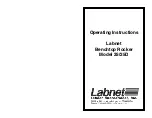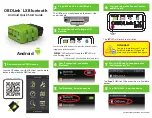
1-6
User Manual
1.7 Precautions
1.7.1 General
•
Training on appropriate use of the Visual-ICE Cryoablation System is required prior to conducting
a cryoablation procedure.
•
The physician is solely responsible for all clinical use of the cryoablation system and for any
results obtained by use of the system. The physician makes all clinical decisions prior to and
throughout the cryoablation procedure based upon his/her professional opinion.
•
The Visual-ICE System and the user interface are non-sterile. Contact with any part of the
system or the user interface by a member of the sterile team requires use of customer supplied
sterile accessories, such as a sterile drape.
•
Galil Medical recommends having backup argon cylinders available for each treatment to ensure
sufficient gas is available to complete a treatment.
•
Do not use the Visual-ICE Cryoablation System if any moisture or condensation is present on the
surfaces of the system. Powering up the system containing moisture or condensation could result
in permanent damage to the electrical boards, causing the system to be inoperable.
•
Direct the high-pressure gas supply lines toward the floor and secure the lines with the clips
located on the rear of the Visual-ICE System to minimize the potential for tripping.
•
Confirm that the Manual Vent Valve is closed before connecting the gas lines to the system.
•
Continuously monitor the cryoablation procedure using image guidance such as direct
visualization, ultrasound, or Computed Tomography (CT) to ensure adequate tissue coverage and
to avoid damage to adjacent structures.
•
Galil Medical recommends using the Galil Medical Multi-Point Thermal Sensors (MTS) to monitor
the freeze / thaw temperatures for the intended treatment protocol and to monitor temperatures in
the adjacent organs and structures.
•
Ensure that the MTSs are functioning properly before inserting into the patient by verifying that
they are reading a reasonable room temperature.
•
Cryoablation freezes and destroys tissue. To limit this effect to only the target ablation area, the
physician must determine the means to protect adjacent organs and structures.
•
Position the Visual-ICE System in a manner to avoid draping needle tubing across the patient.
Needle tubing may become extremely cold when conducting freeze cycles during a cryoablation
procedure. It is important that a patient’s skin is protected from direct contact with needle tubing
to avoid the potential for thermal injury to the patient. Ensure an appropriate insulating barrier is
placed as needed (such as towels) or other method is employed to prevent needle tubing from
touching a patient’s skin.
•
No data regarding cryoablation in combination with other therapies is available from Galil Medical.
•
Do not set heavy objects on the monitor when in the down position or on the monitor storage
basin when the monitor is in the up position. The weight limit is 9 kg (20 lbs).
•
Portable and mobile radiofrequency (RF) communications equipment can affect the Visual-ICE
Cryoablation System, causing it to operate improperly. Keep such equipment away from the
system (reference Section 8.7).
•
Use only Galil Medical supplied components and accessories with the Visual-ICE System.
•
Do not connect any other USB equipment to the Visual-ICE Cryoablation System USB port.
•
Use Galil Medical USB flash drive only to export reports or update software. Other data or
software may corrupt the Visual-ICE System.
Summary of Contents for Visual-ICE
Page 1: ...User Manual ...
Page 10: ...viii User Manual This page intentionally left blank ...
Page 22: ...1 10 User Manual This page intentionally left blank ...
Page 30: ...2 8 User Manual This page intentionally left blank ...
Page 76: ...4 30 User Manual This page intentionally left blank ...
Page 114: ...7 32 User Manual This page intentionally left blank ...
Page 122: ...9 2 User Manual This page intentionally left blank ...
Page 124: ...10 2 User Manual This page intentionally left blank ...
Page 125: ......
















































